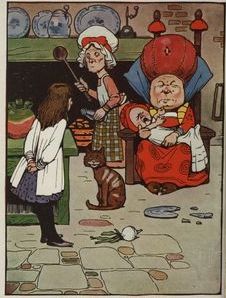 Amid increased chatter about finally getting some legislative fixes made to the horrendous CPSIA, the Democrats seem insistent that crystals and like embellishments must remain banned on children’s products, though (says Rick Woldenberg) they “have no history of causing lead poisoning.” Earlier here, here, here, etc. Related: Jennifer Taggart [belt buckle on Disney Princess pants]; Amend the CPSIA [hair bow maker left with thousands in unsalable inventory]
Amid increased chatter about finally getting some legislative fixes made to the horrendous CPSIA, the Democrats seem insistent that crystals and like embellishments must remain banned on children’s products, though (says Rick Woldenberg) they “have no history of causing lead poisoning.” Earlier here, here, here, etc. Related: Jennifer Taggart [belt buckle on Disney Princess pants]; Amend the CPSIA [hair bow maker left with thousands in unsalable inventory]
Posts Tagged ‘CPSIA and Congress’
“The Real Scandal Behind the Toyota Recall”
Some views you probably won’t be hearing during today’s highly orchestrated Capitol Hill events [Ed Wallace, Business Week] Regarding that “declining quality at Toyota” meme [“The Truth About NHTSA Complaints,” TTAC] Sudden runup in count of deaths “linked to” possible Toyota acceleration is from newly filed reports on old cases [Fumento/CEI] Commentary from Richard Epstein [Forbes.com via Damon Root, Reason “Hit and Run”] Former trial lawyer lobbyist David Strickland, now helping lead charge against Toyota as NHTSA administrator, was principal author of ghastly CPSIA law [Amend The CPSIA] Also: links to ongoing Point of Law coverage.
New at Point of Law
Things you’re missing if you aren’t checking out my other site:
- Iowa federal judge hits EEOC with $4.5 million attorney fee award over “sue first, ask questions later” litigation strategy;
- Jim Copland continues his weeklong blogging of Trial Lawyers Inc.: K Street with posts on the plaintiff’s bar’s Washington, D.C. presence (with discussion of CPSIA, employment litigation, qui tam, and arbitration, among other topics); state lobbying; and public relations, including legal academics, the media, and consumer groups;
- Hmm: House committee conveniently subpoenas Toyota defense documents that plaintiffs had been seeking to unseal (and more on Toyota);
- Obama administration plans crackdown to make more employers reclassify independent contractors as employees;
- Trial bar stirs pot in Florida politics;
- Feds swoop down on 2003 settlement to demand that parties reimburse Medicare as provided by retroactive law.
New campaign to overturn CPSIA dirtbike ban
The Motorcycle Industry Council feels momentum is now on its side in its effort to re-legalize youth motorcycles and all-terrain vehicles, which flunk CPSIA’s ban on lead-containing alloys. [MotorcycleUSA.com] More background here and here.
CPSC reports to Congress on CPSIA
The full report is here (PDF); the commission’s Democratic and Republican members managed to reach consensus on enough points to allow for a bipartisan report. 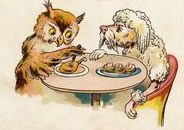 Deserving of particularly close attention are the supplementary views (also PDF) by Commissioners Nancy Nord and Anne Northup, and Northup appends to her remarks many letters from those whose businesses are being ravaged needlessly by the law. The same two commissioners also blog on the subject.
Deserving of particularly close attention are the supplementary views (also PDF) by Commissioners Nancy Nord and Anne Northup, and Northup appends to her remarks many letters from those whose businesses are being ravaged needlessly by the law. The same two commissioners also blog on the subject.
As Nord observes, the full CPSC report:
* acknowledges that the agency needs additional flexibility to implement the lead provisions of the CPSIA, though it does not address how that flexibility should be crafted (since we could not reach agreement on that point);
* acknowledges that books probably were not intended to be regulated under the CPSIA and suggests that Congress may want to consider addressing this issue;
* recommends that the retroactive nature of the law be repealed as the lead limits move from 300ppm to 100ppm; and
* outlines the efforts the agency has made to date to assist small manufacturers and artisans in complying with the CPSIA and states our willingness to work with Congress to address the problems small manufacturers continue to face.
The Handmade Toy Alliance has published some reactions from Rob Wilson as well as its own recommended changes to the law, as has Rick Woldenberg.
Alas, the commission was not exactly a model of transparency in its deliberations: its majority turned down requests from Commissioners Nord and Northup for it to open its debate to the public.
P.S. And more from Rick Woldenberg, Commissioner Anne Northup, and Carter Wood/ShopFloor.
A crack in the CPSIA concrete?
In what one hopes is a break from the “no legislative fix needed” united front put forward by the law’s advocates, Consumer Product Safety Commission chair Inez Tenenbaum has acknowledged in a letter to Rep. George Radanovich (R-Calif) that at least some legislative action establishing exceptions to the law’s sweeping bans might be helpful. Product Safety Letter has the story. Relatedly:
- Handmade Toy Alliance board member Rob Wilson notes
that “Congress Wrote the CPSIA; Only Congress Can Amend It“, and the HTA has now had a chance to meet with CPSC commissioners (more from Rick Woldenberg, who also challenges Tenenbaum on the rhinestone ban and notes Rep. Dingell’s efforts to press her on the law’s shortcomings); Carter Wood thinks it’s time for a Senate hearing;
Can Amend It“, and the HTA has now had a chance to meet with CPSC commissioners (more from Rick Woldenberg, who also challenges Tenenbaum on the rhinestone ban and notes Rep. Dingell’s efforts to press her on the law’s shortcomings); Carter Wood thinks it’s time for a Senate hearing; - Crafter Whimsical Walney, now out of business as regards children’s goods, is not entirely thrilled about the New York Times’s belated coverage of the CPSIA fiasco;
- The ban on brass, and its effects on school bands and kids’ music generally, comes in for criticism from Ryan Young at CEI Open Market, Deputy Headmistress, Rick Woldenberg again, and a Washington Times editorial;
- “You only know if a product is safe if it’s been tested,” claims Rachel Weintraub of the Consumer Federation of America, drawing
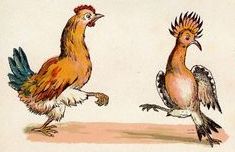 a riposte from Rick Woldenberg;
a riposte from Rick Woldenberg; - Glenn Cook at the Las Vegas Review-Journal calls CPSIA the law Congress “refuses to fix“, while Quin Hillyer at the American Spectator calls it the “worst low-profile law on the books“.
PUBLIC DOMAIN IMAGES from Elise Bake, Der Ball Der Tiere (“The Animals’ Ball”, German, 1891), courtesy ChildrensLibrary.org.
Food safety law expansion barreling through Congress
And per this L.A. Times account, business — at least business with an organized Washington, D.C. presence — is on board, just as it was when CPSIA passed. So what could go wrong?
CPSIA chronicles, September 20
- Rep. Michael Burgess (R-Tex.) doesn’t think Rep. Waxman’s pretend hearing Sept. 10 was enough, and writes a letter to Reps. Waxman and Rush (PDF courtesy Motorcycle Industry Council) explaining why a real hearing is needed (including as an addendum my WSJ piece from last Monday).
- Speaking of CPSIA author Rep. Bobby Rush (D-Ill.), he’s praised the new rhinestone ban [Woldenberg]
- At the Wall Street Journal, a letter to the editor regarding my op-ed of last week generally agrees with its thrust but claims that I “[err] when assigning blame to consumer groups” among others for the enactment. I find this charge baffling, since groups like Public Citizen, PIRG and the Consumer Federation of America 1) were routinely cited in the press during the bill’s run-up to enactment as key advocates of its more extreme provisions, 2) have loudly claimed credit for enacting those provisions and the overall bill ever since, 3) have been routinely cited this year in the press as key opponents of any effort to revisit the law in Congress. Why strive to excuse them from a responsibility that they gladly shoulder? Carter Wood at ShopFloor also notes that labor unions unwisely cheered on their purported consumer-group allies, a stance one hopes they are rethinking in light of the statute’s actual effects on American employers and jobs.
- BoardGameGeek had a discussion of the law again this summer, mostly focusing on the tracking label rules and the burden they pose to makers of new games, but also noting the thrift/reseller effects (earlier). Meanwhile, Handmade Toy Alliance activist Dan Marshall notes on Twitter, “Just spoke with guy who invented a board game about dinosaurs. He’s paying $2400 to get it tested 4 #CPSIA and is mad as hell about Mattel.”
- So let’s all panic now: NPR reports minute amounts of lead alloy in a Disney-branded zipper.
- Before CPSIA came along, Illinois lawmakers enacted their own lead law which, stunt-like, sets an even lower permissible lead level often flunked by common substances such as ordinary garden dirt, according to Rick Woldenberg (earlier on dirt, and related on rocks). More: Wacky Hermit.
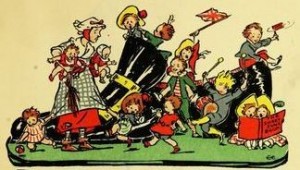

PUBLIC DOMAIN IMAGES from Ethel Everett, illustrator, Nursery Rhymes (1900), courtesy ChildrensLibrary.org.
Welcome Wall Street Journal readers
I’ve got an op-ed in today’s Wall Street Journal on CPSIA (the Consumer Product Safety Improvement Act) and Congress’s unwillingness to reform it despite its calamitous and unnecessary impacts on the children’s product business, especially its smaller participants. If you’re new to this site, here are some pointers for further reading about the issues raised in the piece:
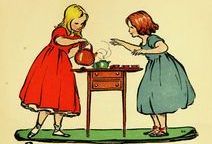
- General coverage of the law;
- Congress’s role, and last Thursday’s hearing;
- The postponement until February of the main testing rules and the minibike and bicycle bans;
- The law’s effects on secondhand stores, on pre-1985 books, and on the toy and apparel businesses;
- The tracking label rules, which became effective last month;
- The exemption of industry giant Mattel from third-party independent lab testing;
- The push for “traceability” in food and farm safety.
Readers who use Twitter may also want to follow this stream, which includes regular updates from my @overlawyered and @walterolson accounts as well as from many other persons who follow the law.
PUBLIC DOMAIN IMAGES from Ethel Everett, illustrator, Nursery Rhymes (1900), courtesy ChildrensLibrary.org. ![]()
CPSIA chronicles, September 12
- On Thursday Henry Waxman’s House Commerce Committee finally held its long-promised hearing on the Consumer Product Safety Improvement Act, the first such hearing by a committee with legislative jurisdiction since the calamitous law went into effect in February.
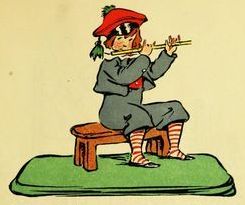 (The Small Business Committee, a panel with no legislative authority over the law, had gone first.) As noted last week, Thursday’s virtually dissent-free event hardly counted as much of a hearing, since Waxman turned down all pleas to allow testimony from actual affected businesses or other critics or victims of the law. Instead he called as his single witness recently appointed CPSC chair Inez Tenenbaum, who hewed closely to the line he (Waxman) wished to hear. A Washington Times editorial is appropriately scathing, and Rick Woldenberg has much more about the committee majority’s finger-in-ears response to the broad outcry over the law. Ranking Republican Joe Barton (R-Texas), who supported the law’s passage, did say that “we have all been inundated” with constituent messages about its ill consequences. The Handmade Toy Alliance has published the statement that Jill Chuckas of Crafty Baby would have made if invited to testify (more).
(The Small Business Committee, a panel with no legislative authority over the law, had gone first.) As noted last week, Thursday’s virtually dissent-free event hardly counted as much of a hearing, since Waxman turned down all pleas to allow testimony from actual affected businesses or other critics or victims of the law. Instead he called as his single witness recently appointed CPSC chair Inez Tenenbaum, who hewed closely to the line he (Waxman) wished to hear. A Washington Times editorial is appropriately scathing, and Rick Woldenberg has much more about the committee majority’s finger-in-ears response to the broad outcry over the law. Ranking Republican Joe Barton (R-Texas), who supported the law’s passage, did say that “we have all been inundated” with constituent messages about its ill consequences. The Handmade Toy Alliance has published the statement that Jill Chuckas of Crafty Baby would have made if invited to testify (more). - In an August 26 WSJ letter to the editor, Eric Havill of Branchport, N.Y. observes that Congress’s refusal to fix the law “is, if possible, even more irresponsible than the original legislation.”
- By a unanimous vote, the CPSC recently confirmed that Mattel, the giant toymaker whose many recalls helped touch off the lead-in-toys panic in the first place, has qualified for an exemption from third-party (outside lab) testing of its products under CPSIA, and can instead test in its own in-house labs. Of course, most of Mattel’s competitors are less fortunate and do not operate on a scale that will make such an exemption feasible. The exemption for “firewalled” in-house labs, deemed by one critic a “hall pass,” was something Mattel obtained through intense lobbying back when the law was under consideration. Like the other giant in the business, Hasbro, Mattel actively lobbied for CPSIA’s passage, and even as the law has brought undreamt-of woe to thousands of smaller producers of kids’ products, the two big companies seem to be doing rather well under it. More: Timothy Carney, Washington Examiner; Brad Warbiany, Liberty Papers; Christopher Taylor, Word Around the Net. Other reactions to the exemption: Holly Jahangiri, Rick Woldenberg, Ed Morrissey/Hot Air (“one of the companies that created the problem in the first place has gotten a waiver”), Katherine Mangu-Ward/Reason (“Mattel now has a cost advantage on mandatory testing, and a handy new government-sponsored barrier to entry for its competitors”), Handmade Toy Alliance.
- What’s going to replace forbidden phthalates in kids’ products now that CPSIA has banned them? Probably alternative plasticizing chemicals about which we know less, notes Andrew Langer in Roll Call.
- It’s old news, of course, that the CPSC asserts the power to go after eBay and Craigslist sellers, church bazaars, homeowners who hold yard sales and other sellers of used items that do not comply with CPSIA and other safety standards (although evidence is very sparse that most members of Congress actually realized the law would reach sales of those kinds.) Last month the CPSC saw fit to announce “Resale Roundup”, a new crackdown on secondhand sales. It also revised its book of guidance for resellers, in ways Rick Woldenberg finds less than enlightening. Discussion: Adler/Volokh, Ed Morrissey/Hot Air (“What did we ever do before the CPSIA protected the US through its throngs of federal nannies? How did we ever survive garage sales in the past 233 years?”), Washington Times (“from yard sales to jail cells”), Katherine Mangu-Ward/Reason, John Stossel, Deputy Headmistress/Common Room (“Remember when Congress assured us that the little guys had NOTHING to worry about with the CPSIA because they weren’t going to come after us? They. Lied.”) On the brighter side, McClatchy’s James Rosen quotes spokesperson Scott Wolfson as saying the commission isn’t planning to seek admittance to inspect private homes and garages to enforce the law. So be thankful for small favors.
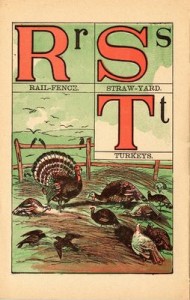
PUBLIC DOMAIN IMAGES from Ethel Everett, illustrator, Nursery Rhymes (1900), and (illustrator not known) Farm Yard ABC (c. 1880), both courtesy ChildrensLibrary.org.
